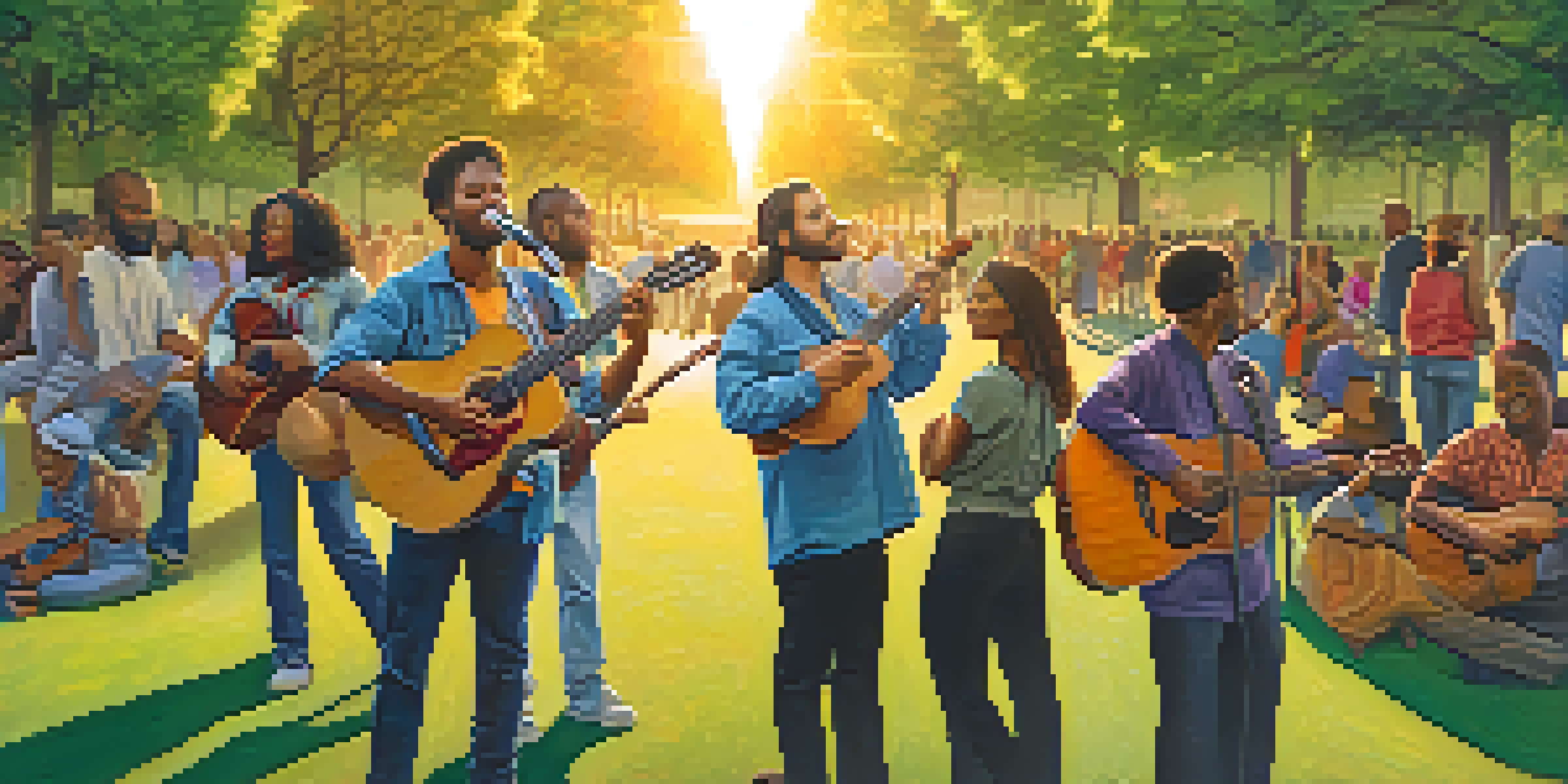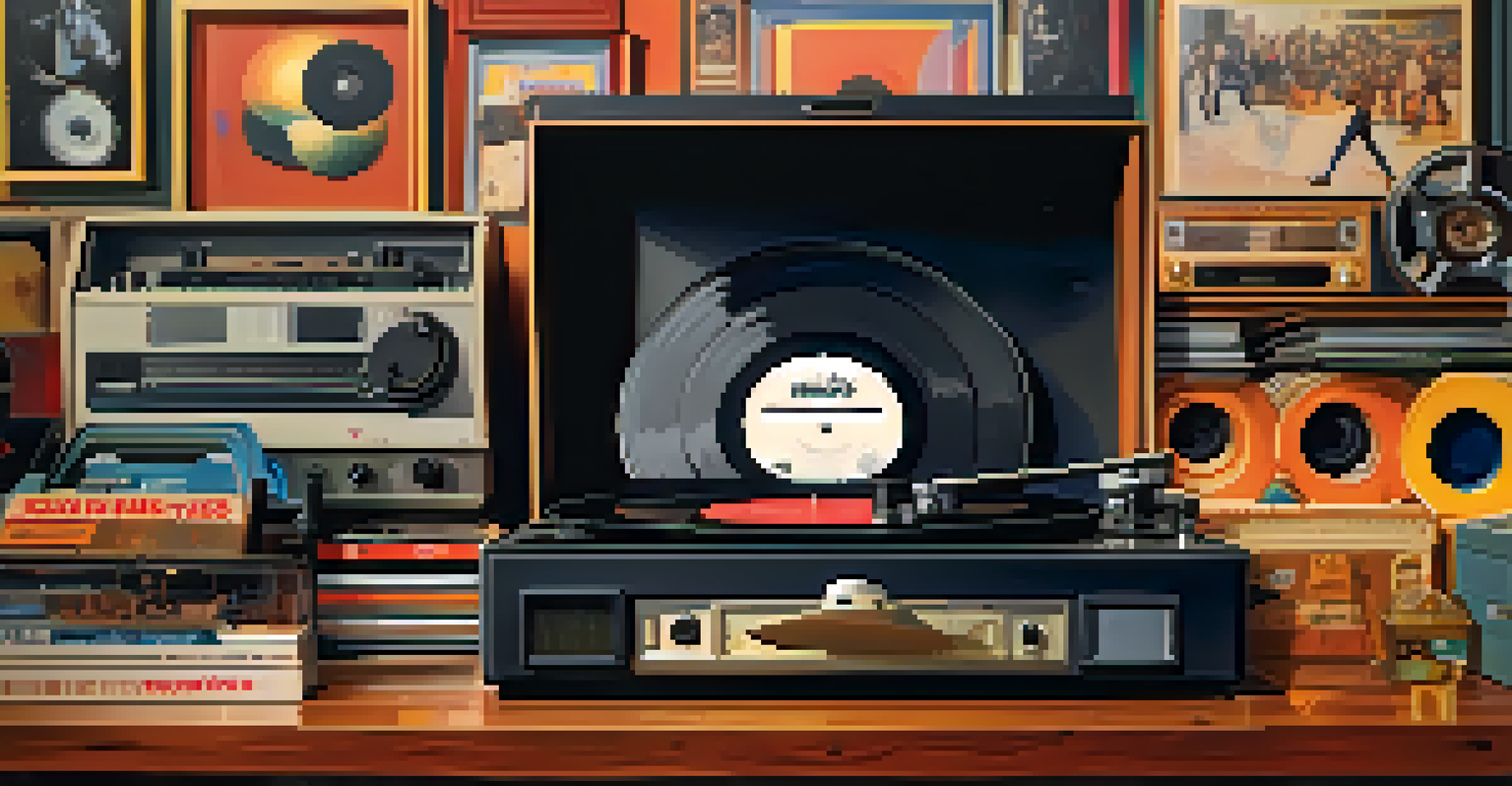The Role of Music in Shaping Collective Memory and History

Understanding Collective Memory and Its Importance
Collective memory refers to how groups of people remember their past, shaping their identity and culture. It goes beyond individual memories, encompassing shared experiences and narratives that define a community. This concept is vital as it helps societies bond over common histories, fostering a sense of belonging.
Music can change the world because it can change people.
Music plays a pivotal role in this process, acting as a powerful medium that evokes emotions and memories. For instance, national anthems not only stir feelings of patriotism but also recall significant historical events. These melodies become ingrained in the minds of community members, reinforcing shared identity.
As people encounter music throughout their lives, they associate specific songs with moments in time, creating a tapestry of collective memory. Whether it’s a protest song from the civil rights movement or a tune from a significant cultural event, these sounds help preserve and communicate the essence of collective experiences.
How Music Reflects Historical Events
Music serves as a lens through which we can view and understand historical events. From war ballads to protest songs, music often emerges as a response to societal changes, encapsulating the sentiments of the time. For example, songs like 'Imagine' by John Lennon reflect aspirations for peace during turbulent eras.

This connection between music and history allows us to revisit and analyze past events in a unique way. When we listen to these songs, we can feel the struggles, hopes, and dreams of those who lived through those times. It's almost like a time capsule, preserving the emotional landscape of history.
Music Shapes Collective Identity
Collective memory is formed through shared musical experiences that foster a sense of belonging within communities.
Moreover, music can help highlight overlooked narratives in history, giving voice to marginalized communities. By amplifying these voices, music can reshape our understanding of history, ensuring that diverse perspectives are included in the collective memory.
The Role of Music in Social Movements
Throughout history, music has been a driving force in social movements, uniting people around common goals. Songs like 'We Shall Overcome' became anthems of the civil rights movement, rallying individuals to fight for justice and equality. The repetitive, catchy nature of these tunes made them easy to remember and sing, fostering a sense of solidarity.
Without music, life would be a mistake.
These movements often utilize music to express their struggles and aspirations, making complex issues more relatable. For instance, hip-hop has emerged as a powerful genre for addressing social injustices, giving voice to the experiences of marginalized communities. Artists like Kendrick Lamar and J. Cole tackle topics of systemic racism and inequality through their lyrics.
In this way, music not only serves as a backdrop for activism but also as a catalyst for change. It inspires action, encourages dialogue, and helps to shape the narrative around social issues, making it an essential tool for collective memory and history.
Music as a Tool for Healing Collective Trauma
Music can also play a crucial role in healing collective trauma, providing an outlet for shared grief and pain. After devastating events, communities often turn to music to process their emotions and begin the healing journey. Songs that reflect loss or resilience can unite people, allowing them to mourn together.
For example, after the September 11 attacks, many artists created songs that addressed the collective trauma experienced by the nation. These tracks helped individuals express their feelings and fostered a sense of community among those affected. Music becomes a shared language of healing and remembrance.
Music Reflects and Influences History
Historical events are often mirrored in music, allowing us to understand societal changes and the narratives of marginalized voices.
Furthermore, music therapy has been shown to aid in recovery from trauma, reinforcing the bond between music and emotional healing. By participating in musical activities, individuals can reconnect with their shared experiences, creating a powerful tool for rebuilding collective memory.
The Influence of Technology on Musical Memory
In the digital age, technology has transformed how we create, share, and remember music. Streaming platforms and social media allow for instant access to songs that shape collective memory on a global scale. This has led to a more interconnected musical landscape where cultural influences can spread rapidly.
For instance, viral trends on platforms like TikTok can resurrect older songs, introducing them to new audiences and reinvigorating their cultural relevance. This phenomenon shows how technology can keep collective memories alive, bridging generational gaps and creating new connections.
However, this rapid sharing can also dilute the original context of songs, making it essential to approach these musical experiences with awareness. Understanding the historical and cultural significance behind songs enhances our appreciation and helps maintain the integrity of collective memory.
The Power of Nostalgia in Musical Memory
Nostalgia plays a significant role in how music shapes collective memory, evoking feelings tied to specific moments in our lives. When we hear a song from our youth, it can instantly transport us back to that time, stirring up memories and emotions associated with those experiences. This connection creates a shared history among individuals who experienced similar cultural moments.
For example, the resurgence of 80s and 90s music in contemporary media often sparks nostalgia, reminding listeners of carefree days. This phenomenon shows how music can transcend time, linking generations through shared experiences and emotions. It’s a testament to the enduring power of music in shaping our identities.
Technology Transforms Musical Memory
The digital age reshapes how we access and share music, impacting our collective memory by bridging generational gaps and cultural influences.
Ultimately, nostalgia fosters a sense of belonging and community, as individuals bond over shared musical memories. By exploring these connections, we can better understand how music influences our collective memory and the way we perceive history.
Looking Ahead: The Future of Music and Collective Memory
As we move forward, the relationship between music and collective memory will continue to evolve. With the rise of artificial intelligence and new musical technologies, the way we create and consume music may shift dramatically. This evolution will undoubtedly impact how we remember and interpret our shared histories.
Moreover, as societies become more diverse, music will play a crucial role in reflecting and preserving a multitude of narratives. It will be essential to embrace these varied perspectives to enrich our collective memory, ensuring that all voices are heard and valued. This inclusivity can lead to a more comprehensive understanding of history.

In conclusion, music's ability to shape, reflect, and heal collective memory is a powerful reminder of its significance in our lives. As we navigate the future, let’s celebrate music's role in connecting us to our past while fostering understanding and unity for generations to come.